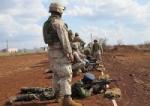I've been trying to remember a reference (I'm on holiday now without my library...). Ah....
Algaze, Guillermo, The Uruk world system : the dynamics of expansion of early Mesopotamian civilization / Guillermo Algaze. Chicago : University of Chicago Press, c1993.
Algaze, along with several others whose names I'm blanking on, argues that there was a major war spanning from southern Iraq into eastern Turkey about 3500 bce or so. On earlier conflicts, there is quite a bit in the archaeological record of Europe: check out references to the Bell Beaker People.
Kadesh, as a battle, is fairly late (Egyptian New Kingdom), but if you are looking for the origins of war, you need to step back and ask yourself about origin points. How are you defining "war"? Did war start with a single group or in multiple places? What specific indicators in the archaeological and/or oral historic record are you using as indicators of warfare?











 ).
). ), say the Egyptian Kopesh sword (from a sicle).
), say the Egyptian Kopesh sword (from a sicle).

 ....
....





Bookmarks